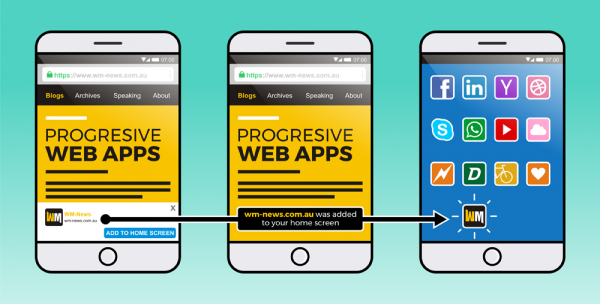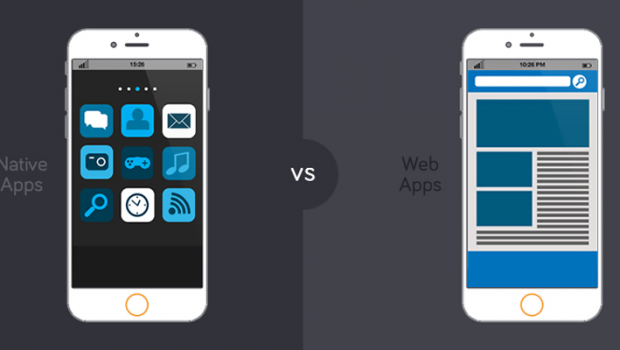Mobile or web applications – suit yourself
Most of the business ideas today resolve around an app that conveys the idea and act as a bridge between the business and consumers using an elegant, purposeful interface. You need your app on popular mobile platforms owing to the widespread use and availability of 3G/4G or better mobile internet even in developing countries. Mobile platforms have gotten more capable and powerful as ever to be able to manage most of the tasks we needed a portable computer previously. There are primarily two popular ways to bring your application to popular mobile platforms namely mobile apps and web applications.
Mobile Apps

With introduction of touch screen like inputs, it is rare to imagine an individual‘s life without a smartphone. Some of the valid government digital identification and important papers are available via same mobile apps in many countries. Developing a mobile application can get your business idea best outreach with easy access to your potential clients or customers. Since end-users tend to reckon on application instead of web browser on a smartphone, it is significant to publish applications for all the popular mobile OS in the market. The two popular mobile OS are iOS by Apple and Android by Google. As a business owner you are not at the liberty to ask your client to use a specific platform. Without a doubt, apps on both the platforms must be published. It is not as easy as it sounds. There are a lot of technical aspects to maintaining and publishing them. It can get tricky to keep the same pace for both platforms while offering the same features. You need coders who know appropriate programming languages for both the platforms.
Native apps are faster and has better integration with numerous tools and component of a given mobile OS. For Android , you must know Java/Kotlin(Java Family) language to develop apps. Apple recommends Swift to iOS developers to write apps that run native on iOS. While native apps on smartphone run faster, your company needs to maintain multiple teams for respective mobile platforms. It can burden a business by increasing the running cost etc. Woxapp comes to rescue and help your business create best quality native apps for both the popular platforms. So you can publish them for your clients in the respective application store.
The mileage of working with Woxapp is that you get a wide variety of technical expertise required to satisfy the growing demand of vibrant interface that users use to access your business. It isn’t possible for regular business owners to maintain such teams. A business owner should be focusing on the prosperity of the idea and realizing its true potential instead of fiddling around with code. Moreover, your on-site IT department not only get to oversee the process but there is tremendous possibility of inputs during a detailed multi-stage process of mobile application development for both the platforms. What makes Woxapp different is that this process is not a formality or an on-paper thing with Woxapp. Instead it is a thorough scanner that every application goes through with a single exception. You as a business owner get to interact with Woxapp at any stage for real inputs without any red-tape whatsoever. Your on-site developers can always make suggestions and co-operate or work together to bring out the best for your clients. I would say, this is an ideal way to develop apps.
Many like to opt for an alternative to avoid development for multiple mobile platforms called web apps. As of now, by no means these applications can reach integration level that native apps offer, even if some basic web apps can get on par in terms of functionality if not better.
Web Apps
Early web was simple with plain text and markup language to links them together. Thanks to extensions like JavaScript, TypeScript, WebAssembly, websites have successfully changed into Web Apps.
Web apps can be run in any modern browser for example Chrome or Firefox. By using proper web standards with minimum testing you can run web apps on any modern browsers today. Further, you can take advantage of frameworks like Electron Framework to create Desktop Applications. Web apps can be made to run in Desktop easily unlike native mobile apps. It is an obvious benefit owing to nature of development.
Web apps can get slow in some cases but are highly portable in nature. You can use one of multiple language available like React Native, Nativescript to create apps for both Android and iOS(or in future,other operating systems which supports webview) simultaneously.
The business owner has to balance between portability and native mobile apps that offer more control and flexibility in long run. It comes down to requirement of a specific project. If you find web development easy, so you can choose Web apps depending on the project and how you wish to deploy it. You can release your application as Progressive Web App. A progressive web application (PWA) is a type of application software delivered through the web built using common web technologies including HTML, CSS and JavaScript. It is intended to work on any platform that uses a standards-compliant browser. Functionality includes offline support, push notifications and device hardware access, enabling creating user experiences similar to native applications on desktop and mobile devices. Using such technology can make your site/app load very quickly as most of the content is locally cached and stored.

Progressive Web Apps are:
- Reliable – Load relatively better even in uncertain network conditions.
- Fast – Responds quickly to user inputs with smooth animations and non-sluggish interface.
- Engaging – Feel like a native app on the device, with an immersive user experience.
This new level of quality allows Progressive Web Apps to earn a place on the user’s home screen. When launched from the user’s home screen, service workers enable a Progressive Web App to load instantly, regardless of the network state.
A service worker (written in JavaScript) is like a client-side proxy and puts you in control of the cache and how to respond to resource requests. By pre-caching key resources you can eliminate the dependence on the network, ensuring an instant and reliable experience for your end-users. Thanks to PWA, web apps are incredibly fast. So,if done properly, web apps can be credible and not an disappointment.
Progressive Web Apps can also be installed and live on the user’s home screen without the need for an app store. They offer an immersive full screen experience with help from a web app manifest file and can even re-engage users with web push notifications. The Web App Manifest allows you to control how your app appears and how it’s launched. You can specify home screen icons and other skin related details too like a native app.
Since progressive web apps are a type of webpage or website known as a web application , there is no requirement for developers or users to install the web apps via digital distribution systems like Apple App Store or Google Play.
These are the reasons provided by Google itself, for why you must use Web Apps:
1. Worthy of being on the home screen
2. Increased engagement
3. Work reliably, no matter the network conditions
4. Improved conversions
Many platforms, single codebase. Thanks to React-Native and NativeScript, you can create platform-specific versions of components so a single codebase can share code across platforms. With Web Technologies, one team can maintain two platforms and share a common technology. So, you can develop a single app written in web technologies to run on both Android and iOS. With a little effort (like adapting codebase to use Electron APIs) you can make an app run on desktop too. Thus, you can write portable apps which can cover most of the devices that your client or customers use.
Well, both in terms of user experience and revenue Mobile Apps are far ahead of Web Apps or mobile websites.
Conclusion
You must develop Web App if
- You want rather immediate mobile application development.
- Your business interface design does not require a native like rich and smooth UI that existing web technologies simply cannot offer.
- You own a desktop website already and wish to serve the same content for mobile users rapidly.
- You want to make it available in future Devices which can’t run present Apps but can run web applications.
- Your project’s specification don’t state robust system Integration.
- Do not wish to maintain different code for difficult mobile platforms, keeping it cost effective.
You must develop Mobile App if
- You really care about user experience with a comparatively superior and feature rich interface.
- You really care about system integration with robust performance.
- You can afford to maintain native developers for a multiple mobile platforms.
- You want comparatively better outreach with proprietary application stores for a given platform, making it easy to find your application.
- You need superior security. For instance Banking apps and other purposes which must be high security to end-users. Features like SafetyNet APIs are also provided for Native Applications out of the box.
Native mobile apps developed for a given platform apparently offers slick, supreme, feature-rich experience to an end-user. If you are looking for mobile app development, make sure to check out with Woxapp team once, as said above, they have a dynamic, cost effective, truly multi-staged process of mobile application development where no input of yours would be ignored and every byte of co-operation would be welcomed.







![The Story of Xiaomi [Infographic]](https://technofaq.org/wp-content/uploads/2018/06/xiaomi-infographic-150x150.jpg)








